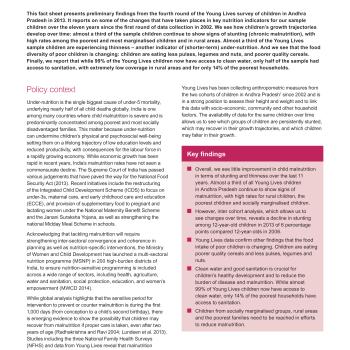Publication Information

This fact sheet presents preliminary findings from the fourth round of the Young Lives survey of children in Andhra Pradesh and Telangana in 2013. It reports on some of the changes that have taken places in key nutrition indicators for our sample children over the eleven years since the first round of data collection in 2002. We see how children’s growth trajectories develop over time: almost a third of the sample children continue to show signs of stunting (chronic malnutrition), especially among the poorest and most marginalised children and in rural areas. Almost a third of the Young Lives sample children are also experiencing thinness – another indicator of (shorter-term) under-nutrition. And we see that the food diversity of poor children is changing: children are eating fewer pulses, legumes and nuts, and poorer quality cereals. Finally, we report that while almost all Young Lives children now have access to clean water, only half of the sample had access to sanitation, with extremely low coverage in rural areas and for the poorest households.

This fact sheet presents preliminary findings from the fourth round of the Young Lives survey of children in Andhra Pradesh and Telangana in 2013. It reports on some of the changes that have taken places in key nutrition indicators for our sample children over the eleven years since the first round of data collection in 2002. We see how children’s growth trajectories develop over time: almost a third of the sample children continue to show signs of stunting (chronic malnutrition), especially among the poorest and most marginalised children and in rural areas. Almost a third of the Young Lives sample children are also experiencing thinness – another indicator of (shorter-term) under-nutrition. And we see that the food diversity of poor children is changing: children are eating fewer pulses, legumes and nuts, and poorer quality cereals. Finally, we report that while almost all Young Lives children now have access to clean water, only half of the sample had access to sanitation, with extremely low coverage in rural areas and for the poorest households.

